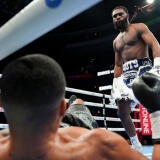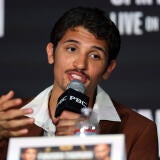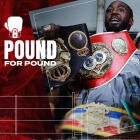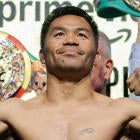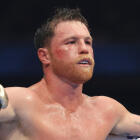Why Terence Crawford has an argument for beating Floyd Mayweather in a mythical matchup
The historic debate between these two legendary fighters is a lot closer than you might think
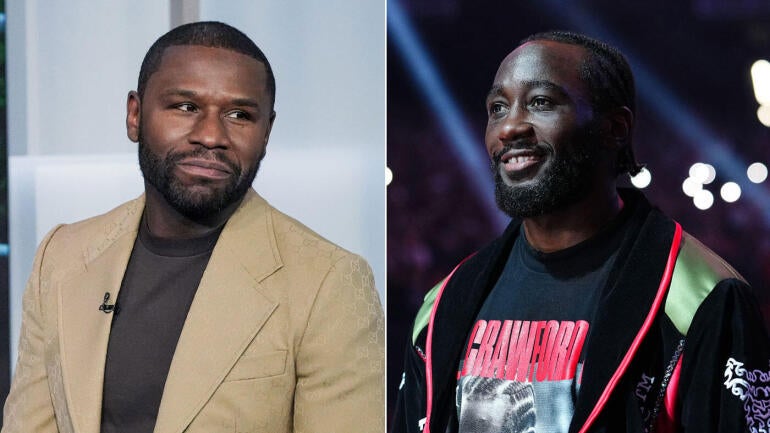
For as humble as Terence Crawford was in the aftermath of his career-defining victory over Canelo Alvarez on Saturday for the undisputed championship, the rest of the boxing world simply won't let the spinoff debates regarding his historical greatness die off so easily.
It's an understandable position for those of us still enamored by Crawford (42-0, 31 KOs) who, two weeks shy of his 38th birthday, effectively moved up three weight divisions to outbox and, at times, outmuscle Alvarez, who was visibly out of answers during the championship rounds, during their superfight in front of 70,000 fans at Allegiant Stadium in Las Vegas.
In a fight that some felt could decide who was the best boxer of the post-Floyd Mayweather/Manny Pacquiao era, Crawford appeared to accomplish just that (with apologies to Oleksandr Usyk and Naoya Inoue) by becoming just the sixth male boxer to win titles in five divisions and the first in the four-belt era to become undisputed champion in three of them.
After years of being unable to secure legacy fights due to being on the wrong side of the street in boxing's business and political divide, Crawford has made the most of promotional free agency in recent years by demolishing unbeaten Errol Spence Jr. in their undisputed welterweight clash in 2023 before returning to capture a 154-pound title last summer against a difficult Israil Madrimov.
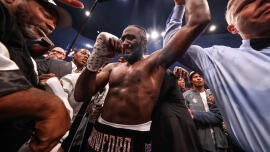
It was this weekend's victory over Alvarez, boxing's biggest star over the last decade and its pound-for-pound king as recently as 2022, that catapulted Crawford into a higher tax bracket from a financial standpoint and (more importantly) in terms of his legacy.
But when he was asked about whether he has succeeded the exploits of Mayweather (50-0, 27 KOs), who retired for good in 2017 after his stoppage of Conor McGregor, Crawford wanted nothing to do with the comparisons.
"Listen, Floyd was the greatest of his era and I'm the greatest of my era," Crawford said at the post-fight press conference. "There is no need to compare."
The debate, however, would heat up some 15 minutes later when Alvarez, who had nothing but respect for Crawford in defeat, was asked which fighter was better considering Alvarez, then 23, had suffered his first pro defeat to a 36-year-old Mayweather in 2013.
"[Crawford] deserves all of the credit. I tried my best tonight and just could not figure out the style; he had everything," Alvarez said. "I think Crawford is way better than Floyd Mayweather."
Mayweather vs. Crawford Tale of the Tape
| Fighter | Floyd Mayweather | Terence Crawford |
|---|---|---|
Nickname | Pretty Boy, Money | Bud |
Record | 50-0, 27 KOs | 42-0, 31 KOs |
Career | 1996-2017 | 2008-present |
Hometown | Grand Rapids, Michigan | Omaha, Nebraska |
Height | 5-foot-8 | 5-foot-9 |
Stance | Orthodox | Switch |
Titles | Five divisions (130 to 154 pounds) | Five divisions (135 to 154, 168) |
Undisputed titles | None | Three (140, 147, 168) |
Five best wins | Diego Corrales (TKO10, 2001), Oscar De La Hoya (SD12, 2007), Miguel Cotto (UD12, 2012), Canelo Alvarez (MD12, 2013), Manny Pacquiao (UD12, 2015) | Yuriorkis Gamboa (TKO9, 2014), Shawn Porter (TKO10, 2021), Errol Spence Jr. (TKO9, 2023), Israil Madrimov (UD12, 2024), Canelo Alvarez (UD12, 2025) |
To be honest, it's a debate that isn't easy to solve so quickly, even if the respective eras in which Mayweather and Crawford were on top seemed to slightly overlap one another (Crawford won his first world title in 2014, one year before Mayweather won the final title fight of his career before retiring for two years). Not to mention that Alvarez, whose resume dwarfs that of Crawford from the standpoint of high-quality wins, was long considered to be ruling over his own era until the result of last weekend's fight.
For as impeccable as Crawford's last three fights are over the past two years and the impact each one had on his legacy, it took until he defeated Spence at age 35 to truly earn recognition as one of the greatest boxers of this century. And even with Crawford equaling Mayweather as a five-division champion, comparing the name value alone of the fighters each have beaten on their resumes is an exercise that almost overwhelmingly favors Mayweather.
Crawford captured world titles from unbeaten champions in highly respectable wins against Yuriorkis Gamboa, Viktor Postol, Jeff Horn and Madrimov, but the amount of truly elite victories he has recorded tends to center around Shawn Porter, Spence and now Alvarez. Crawford also defeated big names like Amir Khan and Kell Brook in PPV clashes, but both were considered well past their respective primes.
Mayweather, who was the true "Money" man (pun intended) of his era and the highest-paid boxer in history and who reigned atop the P4P rankings for much of his career, boasts an almost unrivaled run of wins over current or future Hall of Famers like Arturo Gatti, Oscar De La Hoya, Ricky Hatton, Juan Manuel Marquez, Shane Mosley, Miguel Cotto, Pacquiao and Alvarez.
In addition, Mayweather scored incredibly impressive title wins over the likes of Genaro Hernandez, Diego Corrales, Jose Luis Castillo (twice), Zab Judah, Robert Guerrero and Marcos Maidana (twice).
Comparing resumes, however, doesn't tell the full story.
Crawford wasn't even half of the showman and charismatic PPV force that Mayweather was, which meant his former promoter Top Rank had trouble landing big fights for him as such a high risk/low reward commodity (which undoubtedly played a huge role in Crawford never getting a Pacquiao fight even though they shared the same promoter). And even though Mayweather's resume should only age like a fine wine in the coming decades due to name value alone, the timing of many of his biggest fights still come with an asterisk in the eyes of his biggest critics considering Mayweather, as the simultaneous P4P and PPV king, had the leverage to fight everyone on his own terms and strategic timing.
We all remember the fact that the Mayweather-Pacquiao superfight, which remains the richest title bout in boxing history, came upwards of five years (and two Pacquiao losses) after its ideal timeframe. Mayweather also made Alvarez suck down three pounds to a catchweight, didn't fight Mosley until he was almost 39 (following a 16-month layoff) and purposely missed weight by two pounds to gain an advantage against Marquez.
The area of comparison in which Crawford might have the edge against Mayweather, however, comes in terms of a mythical head-to-head matchup, particularly when taking into account their welterweight primes.
Mayweather competed at 147 pounds for much of the final 10 years of his career, going 12-0 at welterweight from the ages of 28 to 38. Crawford, meanwhile, fought as a welterweight for five years, going 8-0 from the ages of 30 to 35.
From the standpoint of his critics, a contemporary like Crawford with elite speed, power and ring IQ would be the exact type of opponent that the prime welterweight version of Mayweather would've done his best not to fight. It's the same reason why some have felt Mayweather wanted nothing to do with former champion Paul Williams during his brief run as an elite welterweight from 2006-08 and the exact reason why Thomas Hearns and Sugar Ray Leonard have long been seen as nightmare mythical matchups for him.
It's when you add in Crawford's other dynamic elements, however, that the mythical equation becomes an even juicier one. Crawford is also one inch taller than Mayweather, has a three-inch advantage in reach, is one of the best defensive boxers of this century and is a switch-hitter who won his two biggest fights (Spence and Alvarez) exclusively as a southpaw.
Crawford also possesses a bonafide mean streak and incredible finishing ability, particularly late in fights, which is something Mayweather never faced at 147 pounds against an opponent still in their prime (he defeated more mature versions of De La Hoya and Cotto when they were both at 154 pounds).
This isn't an exercise meant to dunk unnecessarily on Mayweather or look past the incredible accomplishments he made to the sport, both commercially and critically. It should also deserve reminding that Mayweather, the consummate boxer-puncher, lost the ability he had in the smaller weight divisions to search for knockouts as aggressively due to chronic hand injuries that played a key role in changing his style over the second half of his career to more of a defensive potshotter (and a brilliant one at that).
But with all that said, given what we know now about Crawford's daring-to-be-great persona and the late-career accomplishments that have justified his placement among the greatest fighters in the history of the sport, it isn't sacrilege to suggest that he would've given Mayweather problems had they been able to meet on equal terms at any point in their respective primes.
Mayweather might have been more accomplished from the standpoint of names alone, but Crawford almost certainly took more chances to prove his greatness, especially considering both made their pro debuts not that far from one other in terms of weight (Mayweather at 131 pounds in 1996 compared to 137 pounds for Crawford in 2008). That makes it all the more impressive when you consider Mayweather, who was never an undisputed champion, topped out at 154 pounds while Crawford, without the need for a catchweight, went as high as commandeering the 168-pound title for his third undisputed reign.
However you rank him, Crawford has that old-school dog in him and the adaptability to suggest he could've dominated just the same in any era before or after him. And even though it took longer than expected for him to get an opportunity to shine this brightly, there's still time for Crawford, especially should he fancy a run at 160 pounds, to only add on to what he has already accomplished.

